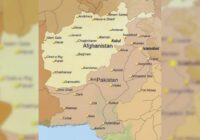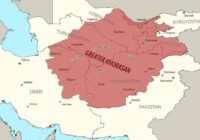A new generation of entrepreneurs are aiming to prove that creativity is alive and kicking in Afghanistan.
The idea first started in New York City’s Soho district and arrived in Kabul’s Karte Seh—a recently rebuilt residential area. “[A] few years ago, I had the opportunity to visit the co-working space of a friend in New York,” says Suleman Fatimie, a 36-year-old Afghan entrepreneur and the founder of the initiative. “I [got] inspired: Why not do something similar here in Afghanistan?”
Daftar, the first co-working space ever established in the country, is located inside the Afghanistan Centre for Excellence—a management consulting firm where Fatimie is a managing partner. From the outside it appears like any modern Afghan building, surrounded by walls with a central garden and enclosed by other compounds. Inside, a fresh breath of warm colors and coffee inundate the office rooms, decorated with trendy designs and traditional elements of Afghan culture.
Bag Full of Ideas
There is a volleyball courtyard, a mini gym and a prayer room where men and women alternate in the time dedicated to salah (prayer). But there are also meeting, conference and silence rooms, along with common areas where you can take a break and chat. The 50 employees of the Afghan Centre for Excellence, graduates from the best universities of the region, share the same facilities, increasing the opportunity for networking and enjoyable leisure time.
“[It is] not easy for Afghan[s] to accept the idea of not having a dedicated office,” explains Fatimie. “But slowly, we are getting used to it.”
His business models are Google and Facebook, but the environment he and his team have created recalls aspects of the unique Afghan resourcefulness: “Here, when you wake up in the morning, you do not know if you are going to come back home alive. In an environment like that, we want to make sure the internal environment here is as much fun as possible.”
At the Afghan Centre of Excellence, they already call him “the creative man.” His bakery, Khanagi, opened few months ago in one of the most popular areas of Kabul, Shar-e Now, and it is already an icon to both Afghans and internationals. Yet Fatimie’s innovative approaches to work and the idea of a co-working space were greeted with concern by some of his employees. At the beginning, some women felt uncomfortable with the idea of not having their own private office. Others believed that sharing common spaces with “outsiders” could cause distractions from office duties.
However, this was not to last. Soon the project was welcomed and many have embraced the idea enthusiastically. Now Fatimie’s aim is to contrast a rigid hierarchy work model and support local start-ups by offering them a stimulated environment for $225 a month.
Co-working spaces have become one of the fastest-growing global trends over the last decade, but the idea is definitely new to Afghanistan. In the major urban centers, young people are still struggling to complete their education—divided between work and family duties. After graduation, the market offers very little reward for their efforts. The voice of youth in Afghanistan, as with other traditional societies, is rarely considered, and elders’ opinion is always more valued.
“When I [came] back from a year study abroad,” says Abdulhay Sadrey, a senior manager at the center, “I had a bag full of ideas, but it was hard to convince my friends and network to believe in it.”
Frustration
The frustration of a donor-based economy is also a major challenge. According to the World Bank, private investment slowed down significantly in 2014, evidenced by a drop of nearly 50% in new firm registrations since 2012. A high unemployment rate forces many Afghans to work in the aid sector for foreign organizations, and ideas for creating new businesses remain largely unheard of.
Amid a hopeless, significantly traumatized society, pragmatism is more accepted than innovation, and loans are rare and difficult to obtain. Moreover, there are the basic budgetary needs to start a business. In Kabul, renting a building costs around $500 a month. However, with the cost of security and high-speed internet, the minimum budget of running an office exceeds $1,000.
Meeting the right contacts is extremely difficult. Besides the embassy networking channels and few Western institutions, there are no other public spaces where networks can be generated. Afghans meet mainly in private due to both security and cultural reasons. Insurgency groups have attacked several restaurants in recent years, and others had to close under security pressure and consequent economic challenges.
By creating a co-working space, the aim is to help new start-ups to cope with these difficulties: “At Daftar, we would like to see a combination of established small companies and also have representative[s] of big companies. But mainly, we would like to see start-ups coming up and help them to grow,” Suleman explains.
Fatimie himself started as a young entrepreneur in Afghanistan with very little private investment but many ambitions. Having grown up in Pakistan, where his family fled in 1980 during the Soviet occupation, he moved to Egypt during his university days and finished his education in London. In 2012, he moved back to Kabul, switching between aid donors and the private sector.
After gaining enough experience, he thought it was the right time to implement his ideas and established a management consultancy firm. Now, by creating a co-working space, he and his colleagues hope to facilitate the efforts of other young people who are facing the very same challenges.
“With a co-working space, people coming from different sectors can sit beside each other and share ideas. It is a unique benefit,” says Sadrey, who is also part of the committee entitled to select the suitable candidates for the workstations offered.
The first elected to join this initiative is Ahmad Naweed Ahmadzai, the Microsoft representative in Afghanistan. “It an amazing place,” he says, “far away from traffic and chaotic noise. I am so glad to work here.”
Representatives of small businesses, consultants and new local start-ups have also showed interest in renting space at Daftar. For now, there are just eight places available, but there are plans to expand soon.
“We would like to open other co-working offices also in Mazar Sharif and Herat,” mentions Fatimie.
The only requirements for being part of the project are: a positive attitude, a passion for teamwork and flexibility. These attitudes not only act as a catalyst of change toward a business mentality, but also as inspiration for a generation of youth, struggling every day to prove that creativity is alive and kicking in Afghanistan.
The views expressed in this article are the author’s own and do not necessarily reflect Fair Observer’s editorial policy.
Photo Credit: Halfpoint / Shutterstock.com
 We bring you perspectives from around the world. Help us to inform and educate. Your donation is tax-deductible. Join over 400 people to become a donor or you could choose to be a sponsor.
We bring you perspectives from around the world. Help us to inform and educate. Your donation is tax-deductible. Join over 400 people to become a donor or you could choose to be a sponsor.
Support Fair Observer
We rely on your support for our independence, diversity and quality.
For more than 10 years, Fair Observer has been free, fair and independent. No billionaire owns us, no advertisers control us. We are a reader-supported nonprofit. Unlike many other publications, we keep our content free for readers regardless of where they live or whether they can afford to pay. We have no paywalls and no ads.
In the post-truth era of fake news, echo chambers and filter bubbles, we publish a plurality of perspectives from around the world. Anyone can publish with us, but everyone goes through a rigorous editorial process. So, you get fact-checked, well-reasoned content instead of noise.
We publish 3,000+ voices from 90+ countries. We also conduct education and training programs
on subjects ranging from digital media and journalism to writing and critical thinking. This
doesn’t come cheap. Servers, editors, trainers and web developers cost
money.
Please consider supporting us on a regular basis as a recurring donor or a
sustaining member.
Will you support FO’s journalism?
We rely on your support for our independence, diversity and quality.










Commenting Guidelines
Please read our commenting guidelines before commenting.
1. Be Respectful: Please be polite to the author. Avoid hostility. The whole point of Fair Observer is openness to different perspectives from perspectives from around the world.
2. Comment Thoughtfully: Please be relevant and constructive. We do not allow personal attacks, disinformation or trolling. We will remove hate speech or incitement.
3. Contribute Usefully: Add something of value — a point of view, an argument, a personal experience or a relevant link if you are citing statistics and key facts.
Please agree to the guidelines before proceeding.